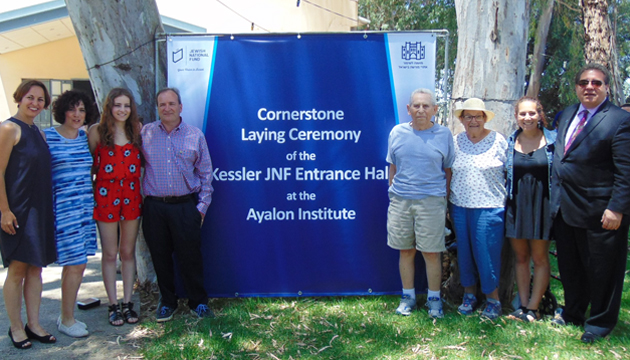
By: Jennifer Tzivia MacLeod
Meir Usherovitz, a young Holocaust survivor, was a soldier in Israel’s new and struggling army during the 1948 War of Independence. At the same time, at a kibbutz near Rehovot, a secret underground bullet factory labored 24-hours a day so that Jewish soldiers, like Usherovitz, could defeat the enemy: first the British authorities that ruled the Mandate of Palestine, then the invading Arab armies intending to destroy the nascent Jewish state. Sixty-nine years later, on a recent sunny afternoon, Usherovitz returned to Israel with his wife, daughters, and grandchildren, standing proudly alongside his son-in-law, Michael Kessler, who laid the foundation stone for a new entrance hall for the Ayalon Institute, the museum built around the original bullet factory.
The Kessler Jewish National Fund Entrance Hall will bring the museum into the 21st century, Kessler said at the ceremony. “It’s about preserving this special, secret place for all generations, and to entice them to learn about one of the foundations of the country and how Israeli ingenuity laid the groundwork for the State of Israel.”
Shlomo Hillel, a founding member of the kibbutz, described the grueling circumstances and the terror of running a bullet factory right under the noses of British forces, often literally. The kibbutz ran a laundry service directly above the bullet factory to cover up the noises of the machines, and British officers were among its many patrons.
“We knew we were doing something very dangerous,” Hillel told the Kessler family and other supporters present at the ceremony. Although the penalty for sedition against the British was death, still, Hillel recalled, “We never for a minute felt miserable.”
They kept the bullet-making operation secret even from friends and family; even some kibbutzniks were kept in the dark, code-named “Giraffes” by those in the know. The British weren’t the only danger. Dealing with live ammunition, there was always the possibility that something would explode, particularly when bullets or explosives had to be stowed for transport.
Though the bullet factory operated for only three years, it was a crucial period in the story of Israel’s independence, according to Russell F. Robinson, CEO of Jewish National Fund- USA (JNF-USA). “Israel’s independence and its experience in achieving it include 50 to 60 sites all around the country. These sites let people understand that the battle for this country was based upon a lot of great luck, God’s will, hope, vision, and spirit,” Robinson said. To preserve and promote these historic sites for generations to come, JNF partners with the Society for the Preservation of Israel Heritage Sites (SPIHS).
The story of independence through SPIHS sites spans the period from the early 1900s at Tel Hai, site of the battle in which Commander Joseph Trumpeldor lost his life; to Atlit, a detention camp used by the British to imprison Jewish immigrants in the 1930s and 1940s; to Jerusalem’s Ammunition Hill, the site of the pivotal battle that led to the reunification of Jerusalem in the 1967 Six-Day War.
And then there is the bullet factory. As Robinson said, “It tells the story of a group of people making ammunition underground, based upon hope, but also based upon the knowledge that if they were going to have independence, they were going to have to fight for it.”
The event was Usherovitz’s first visit to the bullet factory. Born in Poland, he came to Mandatory Palestine after the Holocaust and settled in Gush Etzion, where he fought and was ultimately captured by Jordanian forces in 1948. “They took us to a POW camp, and after nine months, we returned to Israel,” Usherovitz said. He stayed in Israel until 1957 before deciding to move to the United States. “Nobody was left from my family after the Holocaust, so I joined my wife’s family in the U.S.”
Now, he was returning to Israel with his whole family, sharing the history he had lived with his children and grandchildren for the first time.
At the dedication, granddaughter Alana Kessler, 21, said, “The story behind the factory is truly incredible. It’s amazing to hear about how they had so much dedication and how hard they had to fight to get to where they are today.” The whole family was thrilled to be standing there with their grandfather, who had escaped death more than once on his long journey to America.
Robinson praised the commitment and dedication of the entire family, and added, “The Kesslers are amazing. Not only do we have their children here, but their grandfather, who is a Holocaust survivor, is also here and he just dedicated a project in Gush Etzion.”
Kessler himself, however, was more humble. “This is not about the Kessler family at all,” he insisted. “I want people to know all about the great work that JNF does in Israel everyday. It’s not just trees or water; it’s work that helps people have better lives and safeguards their history. I would like all to enjoy this place for many generations to come.”
Prime Minister David Ben Gurion once said: “I doubt if there was a more heroic enterprise … or any other operation involving such constant mortal danger, as the concealed and secret work [of the bullet factory] … and I do not know which was greater, their modesty or their valor.” Today, sites like the Ayalon Institute, through the preservation efforts and generosity of JNF and its supporters, like the Kessler family, are doing their part to ensure that the legacy of those founders’ courage will be retold anew in each generation.

